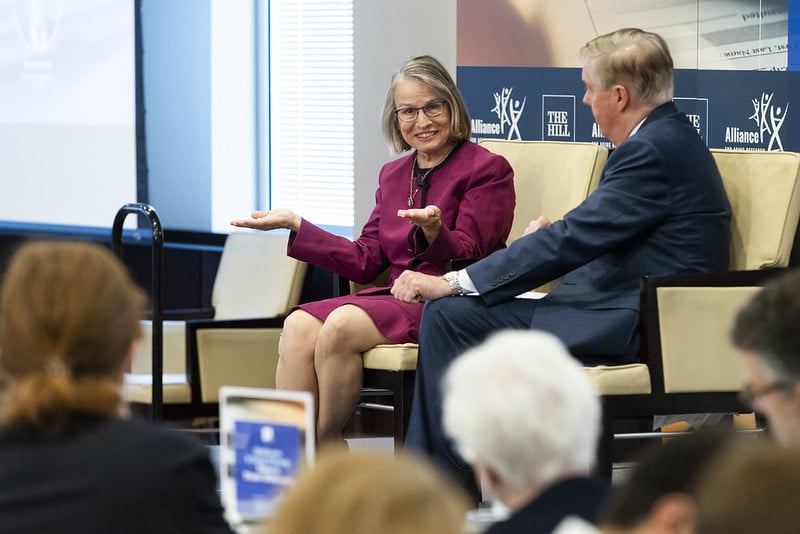Robust Discussion About Unintended Consequences of the IRA Take Center Stage at Alliance Event
Published June 28, 2024
While the Inflation Reduction Act (IRA) has allowed for some benefits to beneficiaries — such as setting a $2,000 cap on out-of-pocket expenditures, decreasing insulin and vaccine costs, and providing the ability to smooth out costs over the plan year — there remain significant concerns about the incentives the IRA has created for plans to find novel ways to control costs. As plans are only allowed to increase premiums by so much, policy experts expect that cumbersome utilization management practices such as step therapy and prior authorization are now on the table and threatening beneficiary access to care.
Policymakers, patient advocates, health economics experts, and providers gathered June 27 in Washington, D.C., to discuss lessons learned from the first round of Medicare drug price negotiation and how the Centers for Medicare & Medicaid Services (CMS) can set impactful guardrails and better prioritize patient outcomes.
Produced in partnership with The Hill, the program, “Medicare & Drug Pricing: Time to Think Differently” tackled how to approach current challenges with the IRA and what Medicare beneficiaries need to know before Open Enrollment.
The event kicked off with Steve Scully, Contributing Editor with The Hill interviewing Rep. Scott Peters (D-CA) who serves as a member of the House Energy & Commerce Committee, about how Democrats worked to implement the IRA in a manner that would keep the pharmaceutical industry in the United States while still reducing drug costs overall. Peters also stated that our budget process places too much emphasis on the current year, and does not adequately adjust for savings down the road, which he believes needs to change.

“We only think about this year…and not what we can save over time. Innovation might cost more money up front even if it saves money down the line,” said Peters. “So, we have to think about budgeting in healthcare in particular because savings will never be this year. We should celebrate the innovations in this industry and make sure that we keep it American.”

In her headliner interview, Rep. Mariannette Miller-Meeks (R-IA) who is a member of the House Energy & Commerce Subcommittee on Health, spoke about the need to protect patients and providers, and that the key to impactful reform is bipartisanship.

“First and foremost [the future of drug pricing is] PBM reform,” Miller-Meeks said. “To do PBM reform – our drug bill on spread pricing – that bill alone would save our government $636 million and have an immediate effect lowering prices for individuals.”
During the program’s sponsor segment, Joe Ruffolo, Senior Vice President & General Manager of The Hill, chatted with Alliance Vice President of Public Policy & Government Affairs Michael Ward who discussed the importance of beneficiaries being aware that significant changes are coming to the Medicare program in 2025. “It’s going to be really important going into Open Enrollment with all of these changes happening for beneficiaries to examine their policies to see if the drugs they are on are still covered and are affordable,” said Ward.

Additionally, Ward shared details of an Alliance-sponsored report published June 27 by Manatt detailing actionable measures that CMS can legally take now, without the need for Congressional action, to protect beneficiaries against harmful utilization management techniques. Ward added that the report digs into the factors that are driving these changes and calls for CMS to increase transparency, implement a less cumbersome appeals process, and ensure that drugs that have had their prices negotiated by the Medicare program are accessible to beneficiaries at costs that reflect the new, negotiated price.
A panel discussion moderated by Scully closed out the event. Panelists included:
- Dana P. Goldman, University Professor of Public Policy, Pharmacy & Economics, University of Southern California; Founding Director, Schaeffer Institute for Public Policy & Government Service
- Daneen Sekoni, Vice President of Policy & Advocacy, Cancer Support Community
- Dr. Jennifer Ellis, Co-Chair, Health & Public Policy Committee, Association of Black Cardiologists & Cardiac Surgeon; Cardiac Surgeon

A few highlights related to patient realizations of the IRA:
- Goldman: “The fact of the matter is we have to figure out a pricing strategy and the pricing strategy, unfortunately, is not the one in the IRA. The pricing strategy in my view should be…commensurate with value. Price per pill is not the price people care about. What we care about is the price for health outcomes and that means tying prices to value and I’m very worried that implementation of the IRA is going to be about we just want the biggest discount off list price and it’s not going to be about how do we encourage valuable medication into the marketplace.”
- Sakoni: “I always believe it’s important when developing drugs or having these conversations that patient input is at the beginning of the conversation and that what matters to patients is part of these decisions…Inappropriate uses of utilization management can actually increase costs to the system.”
- Ellis: “It has to do with privilege and comfort…If you are disinclined to confront or question your physician and there are socioeconomic reasons why you are especially not going to have those conversations. If you are in a busy clinic and not a concierge medicine service, you are less likely to say ‘why are you doing this?’”
